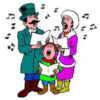Today we are talking about carols. In today’s world we tend to underestimate the significance of music to society. The original meaning of the word carol was circle dance and they were not confined to any specific event though they have always had a festive spirit to them.
Carols were later adapted to depict points of religious doctrine. Well, specifically Christian. Older songs would have likely preserved more of the pagan elements. Even bits of our modern Christmas carols still hint at the pagan sentiments that came before. Dancing originally didn’t have the same sense to it we typically think of today. It was more like communal ceremony than … well, however you would describe modern dance these days. Procession was a key element. It’s why there is so much reference to processions in fairy lore. Many of the old stories of fey sightings may have been reports of people who were at the time considered, officially or not, to be outsiders. Those who still preserved the old ways despite the law of the land at that time. There was little effort to intervene in these processions, even warnings about getting involved at all lest you got permanently involved.
Much of how society understood itself revolved around rites of various kinds. So they spoke of ritual status as if the metaphors enacted were literally true. To have turned your back on publicly accepted ways was often spoken of as “having been asleep” thus the story where a man ventured into the woods and supposedly fell asleep for decades. Rip Van Winkle. The references to sleep were originally spiritual symbolism. The Norse god Odin was thought to sleep for long periods of time. This was how he got and retained his wisdom. He was also the lord of poetry. Bragi was a secondary example of that and may not have been a part of the original mythos. So yes, carols were dance songs, a way to rouse the community and draw them out in the streets.
In the movie Thor, they said they had a healing chamber. I wondered why Odin didn’t regenerate his eye. He didn’t regenerate his eye because it was a form of psycho-surgery. The loss of the eye enabled his spiritual sight.
Everyone familiar with Krampus or the Holly King? Krampus night was another example of a carol or dance procession. Krampus was a demon, originally acknowledged in northern cultures, who was thought to lead a procession of other malicious spirits through the streets on the night before Christmas sort of like an anti-Santa Claus.
Bit of a side track… Does anyone know what culture the original Saint Nick came from?
Greek? He was a Turkish monk. So if they were trying for accuracy in depiction, they would have to show him as middle eastern.
So processions like trick or treating… Young men would take part in the Krampus procession, and they would harass anyone out after nightfall usually doing no harm, but had some member of the community done notable harm, caused community wide distress, they would give this person extra attention. The Krampus procession never had church sanction and had its origins in the regional paganism. I guess some spirits residing in a community are just impossible to put down. What do you think?
Sounds like Halloween. In the cycle of masses they are spiritually very similar. The establishment of Christ’s birth on December 25th didn’t take place until more than a millenia later. It was more likely that he was born in early spring.
So the tradition of carolling… Originally, it was to initiate a community wide celebration. Only later would it be adapted to a quaint custom of visiting the neighbours and enjoying their hospitality. An example of carolling in spring would be Maypole dancing. Is everyone familiar with that?
Each community festival was ultimately a way of permitting and organizing community behaviour. Dancing around the Maypole was a fertility ritual. They also had picnic like feasts, and it was more or less the communally endorsed time to begin courting.
Christmas was originally called Saturnalia among the Romans and was a period of time of socially sanctioned lawlessness. It involved drinking, wild and lewd behaviour and sometimes even more sinister activity, but officially what you got up to during Saturnalia was not punishable by law. A sort of blanket amnesty, carte blanch for wish fulfilment. In theory, it would be an opportune time to elope with that special someone who otherwise had a disapproving father. So charm her in May, make off with her in December? It also may be why Krampus night arose in the north as a reaction to Roman custom. Sure the law won’t get you, but Krampus will. This is why it’s so hard to trace these customs. They had a cosmopolitan origin.
The lawlessness parts don’t seem to change much.
I’m just fantasizing about being able to murder people without being punished. Not punished by the law, but there were other traditions revolving around that. The weregild. You might have to pay quite a bit to keep the peace with the clan whose family member you killed, and you might also face a call to blood duel so most people didn’t kill people lightly. Roman nobles were likely the biggest takers of that option. A discreet knife in the back of a rival when everyone is obligated to keep quiet about it.
Your thoughts are welcome. Be well friends.
Travis Saunders
Dragon Intuitive
~science,mysticism,spirituality~



Leave a Reply